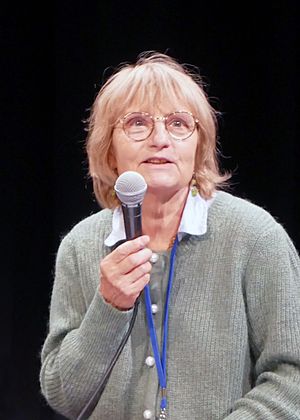Martine Tabeaud facts for kids
Martine Tabeaud (born in 1951) is a French expert who studies geography and climate. She has taught at the University of Paris 1 Pantheon-Sorbonne since 1977. She is part of a group called Riclim, which looks at climate risks. She also thinks about how countries' decisions affect climate issues.
About Martine Tabeaud
Martine Tabeaud was born in 1951. She studied at the Institut national de l’information géographique et forestière (IGN). She also earned advanced degrees in geography and remote sensing. Remote sensing is about studying Earth from space.
She completed important research projects. Her work focused on understanding climate patterns. She used satellite images to study weather in different parts of the world. She also explored how water in the air affects the climate over the South Atlantic Ocean.
Her Career
Tabeaud became a Professor at Paris-Panthéon-Sorbonne in 1989. She held important leadership roles in research centers. She was a director at the French National Centre for Scientific Research (CNRS). This center studies spaces, nature, and culture.
In 2007, Martine Tabeaud helped create a website called doc2geo. It offers geography documentaries that anyone can watch online. She worked with Xavier Browaeys on this project.
In 2019, she helped organize the International Geography Festival (FIG). She was a scientific co-director for the event. The festival's main topic that year was "Climates."
Her Climate Work
In her recent studies, Tabeaud looks at how political choices affect climate change. She explores how decisions made by leaders influence our climate. She also discusses how we fight against climate change. She shared her ideas in an article in Liberation newspaper.
Selected Works
Martine Tabeaud has written many articles and book chapters. Here are a few examples:
- La climatologie générale, Armand Colin, 2008. This book is about general climatology.
- "L’Établissement Al-Assad, ferme d’État sur l’Euphrate avant la liquidation en 2000 : quelques effets pervers d’une approche de développement top‑down", Méditerranée, 2012. This article discusses a state farm in Syria and its development issues.


